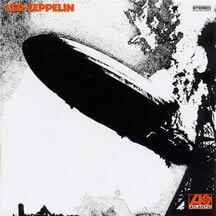- Your joke went over like a lead balloon.
- If that play was supposed to be a comedy, it went over like a lead balloon.
- Her suggestion went over like a lead balloon.
- My joke about the alcoholic went down like a lead balloon.
- go over like a lead balloon: Fig. to fail completely; to go over badly.
- go down like a lead balloon (humorous): if something that you say or show to people goes down like a lead balloon, they do not like it at all .
Go over like a lead balloon:
Meaning
Fail completely and be considered a flop by the public.
Origin
 Go over like a lead balloon is the US version of this phrase. In the UK a complete failure goes down like a lead balloon. The phrase is American in origin and the first mention of a lead balloon with the meaning of something that fails comes from aMom-N Pop cartoon that was syndicated in several US newspapers in June 1924. Actually, that coinage went over like a lead balloon itself and the phrase didn't appear again until after WWII. For example, this piece from The Atchison Daily Globe, May 1947:
Go over like a lead balloon is the US version of this phrase. In the UK a complete failure goes down like a lead balloon. The phrase is American in origin and the first mention of a lead balloon with the meaning of something that fails comes from aMom-N Pop cartoon that was syndicated in several US newspapers in June 1924. Actually, that coinage went over like a lead balloon itself and the phrase didn't appear again until after WWII. For example, this piece from The Atchison Daily Globe, May 1947:"But occasionally a column or comic strip will 'go over' like a V-1 rocket in one community and, for inexplicable reasons, a lead balloon in another."
That's when the phrase can be said to have entered the language and there are many examples in print from US sources of ventures which went down like a lead balloon from that date onward.
The most celebrated use of the term is the part played in the naming of the English heavy-metal band Led Zeppelin. The story goes that Jimmy Page had completed a Scandinavian tour with the New Yardbirds - an impromptu band that was formed from the popular rapidly disintegrating Yardbirds. Keith Moon is reputed to have said the new band would go down like a lead balloon - some reports saygo over like a lead balloon (or zeppelin). Moon is said to have borrowed the term from John Entwistle, who had previously used it to describe bad gigs. Moon and Entwistle, both being English, would have been more likely to have used the English 'go down' version. The details of this are difficult to verify as the anecdotal comment wasn't recorded or put into print at the time and as Moon and Entwistle are deceased. Jimmy Page has confirmed the essence of the story in several subsequent interviews (although, as we all know, 'If you can remember the 1960s, you weren't really there.').
 The irony and the association with the heavy metal lead was too good to miss for an aspiring heavy metal band. They even made sure that people got the point that they were referring to the metal by changing the spelling to Led and avoiding any possible mispronunciation as lead - as in leader (reputedly at the suggestion of their manager, Peter Grant).
The irony and the association with the heavy metal lead was too good to miss for an aspiring heavy metal band. They even made sure that people got the point that they were referring to the metal by changing the spelling to Led and avoiding any possible mispronunciation as lead - as in leader (reputedly at the suggestion of their manager, Peter Grant).The choice of Zeppelin in the band's name was surely influenced by the Hindenberg disaster of 1937. The newsreel of the event, complete with Herbert Morrison's famous Oh, the humanity line, was commonly seen footage in English cinemas during the 1950s and 60s and Page would certainly have been familiar with it. The band used an image of the crash for the cover of their first album. Moon's prediction could hardly have been more wrong. Led Zeppelin became one of the most popular, arguably the most popular, musical act of the first half of the 1970s and reputedly have sold more than 300 million albums.




댓글 없음:
댓글 쓰기